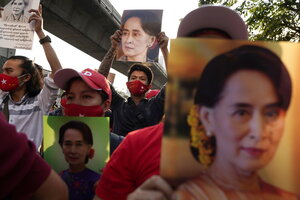Why Myanmar coup shows military's limits
The Army’s arrest – again – of Aung San Suu Kyi and her democracy fighters shows its legitimacy is slipping. More people in Myanmar buy into the idea of self-governance for a modern state.

Members of Myanmar's National League of Democracy protest outside the country's in embassy in Thailand, holding up portraits of Aung San Suu Kyi, after the military arrested her and seized power Feb. 1 from a democratically elected civilian government.
AP
The last time she was put under arrest by Myanmar’s military for promoting democracy – from 1989 to 2010 – Aung San Suu Kyi found she had to learn that her enemy was not the military. “Fear is the first adversary we have to get past when we set out to battle for freedom,” she later said in a lecture. And, as many democracy fighters have discovered, she added that “we have the right to be free from the fear.”
Her detention again on Feb. 1 in a military coup has once more evoked a similar spirit of strength. She sent a message to the 54 million people of her Southeast Asian country that they should simply not “accept the coup.” She asked them to express nonviolent dissent through street demonstrations.
The message itself shows why “the lady,” as she is widely known, remains so popular. Unlike the military’s claim that the people are morally bound to obey it, her legitimacy rests on her call for individual self-governance expressed in a pluralist democracy. Despite the military’s strong hand in government and the economy, she asks citizens to “live like free people in an unfree nation.”
Since Myanmar’s independence in 1947 – when it was known as Burma – the military has either held power or, as in recent years, controlled a limited democracy behind the scenes. It asserts the army best represents the legacy of the country’s founding father, Aung San, a general killed in 1947 while fighting for independence from Britain and the father of the woman who now casts doubt on that claim. She says the way to honor her father’s legacy is to build a “real democratic nation,” although she herself lost some of her international luster after defending the military’s violent suppression of the minority Rohingya.
The latest coup reflects Myanmar’s ongoing struggle for defining legitimacy in government – whether it is freely granted or forced by those with guns claiming to be patriotic guardians of national unity. Since 1988, when a democratic uprising began, the people have slowly shifted against the military. In parliamentary elections last November, Ms. Aung San Suu Kyi’s party, the National League for Democracy, won in a landslide in a surprise to the military. After weeks of disputing the vote count, the generals reverted to strong-arm tactics and took power by force.
While the coup leaders claim an election will be held within a year, democracy promoters not under arrest will likely follow Ms. Aung San Suu Kyi’s advice and not resort to open conflict. She asked her party members to rely on their “inner resources” of being free in their own thought and working to awaken the thought of army generals. “Whatever mistake they have made in the past, we need to give them the chance to change, instead of seeking revenge,” she once told the National League for Democracy. Even for the most hardened coup-maker, she expects a realization of self-governance.

